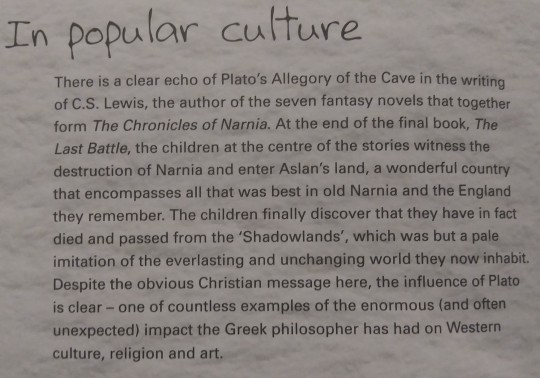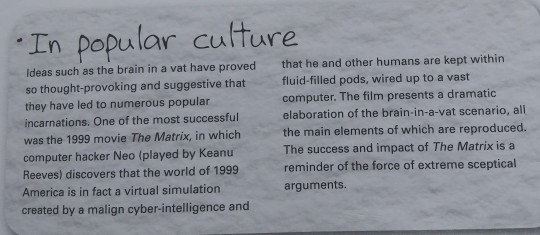Text

Lesson 2. Plato's Cave
"Behold! Human beings living in an underground den... like ourselves... they see only their own shadows, or the shadows of one another, which the fire throws on the opposite wall of the cave." ~ Plato, 375 BC.
Plato's idea was that if we rely on sensory perception, we're only seeing the reflection of things (like shadows on the wall), rather than seeing them directly as they are in their absolute true form (outside in the sun). So Plato derived his Theory of Forms.
This was a take on truth in the world. Attributes or descriptions of forms can be relative when using senses. A tall man is short next to a large tree. An apple that's red in the sunlight is dark maroon in the shadow. Therefore, things must have a true and unchanging form that all other relative sensory descriptions come from.
This caused a fracture in the realm of philosophy that has never quite healed. This 'problem of universals', or debate over universal truth, broke (in the Middle Ages) philosophy into two camps, the realists (or Platonists) who believe there are absolute truths like physical properties and mathematical proofs and even ethical facts, that exist independently of being known, perceived or experienced.
The other group were the nominalists, who believed that things like tallness or redness were just names or labels attached to object to highlight particular similarities between them.
Which way do you lean? Regardless, Plato's Allegory of the Cave continues on to show that the man who escapes the cave and sees the sun and true color and light, now illuminated (literally at this point), returns into the cave to try and describe to the others what he saw, but they, seeing only the shadows, cannot comprehend what he's talking about and dismiss him as a fool - thus showing the plight of the philosopher - ridicule and rejection for attempting to enlighten ordinary people.
In 399 BC, for not tempering his philosophical teachings, the Athenian state tried Socrates and sentenced him to death...
How important are your beliefs to you? In other words, how strongly and how firmly would you stand behind them?
0 notes
Text

Lesson 1. The brain in a vat.
How do we know what we're experiencing is real and not some deception or trick of technology?
8 notes
·
View notes